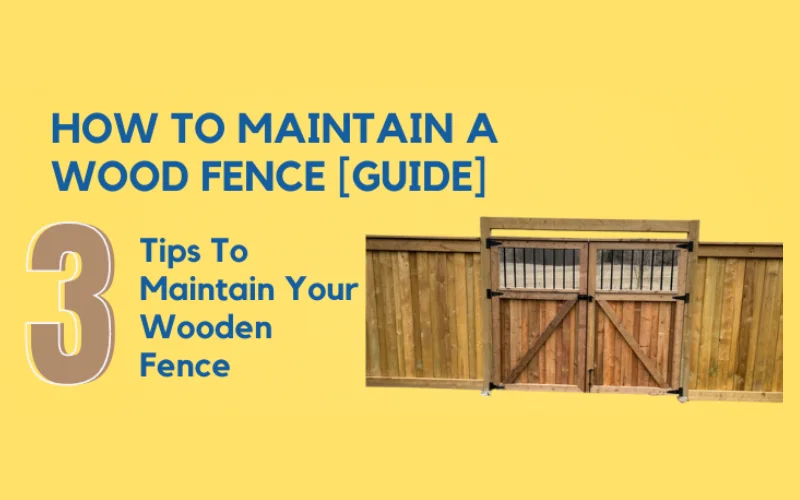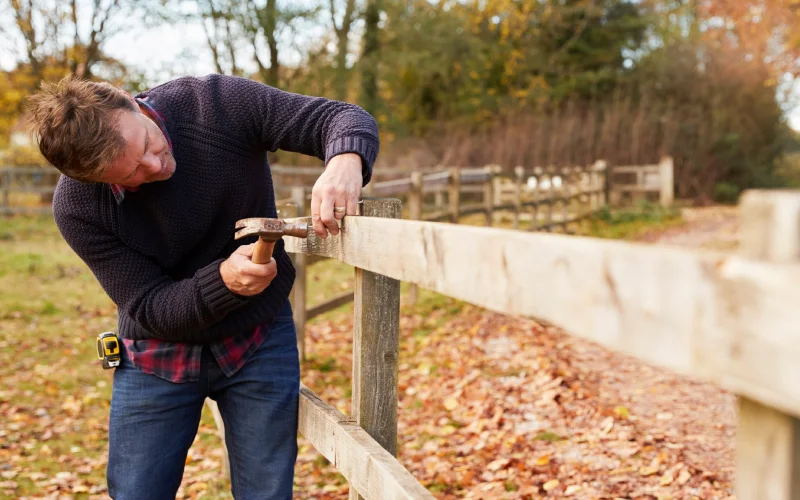How To Maintain A Wood Fence [Guide]

An heirloom wooden table, dresser, or rocking chair can all be restored to look as good as new and ready for the next generation. All it needs is a lick of paint or varnish. But there is very little you can do to restore a wooden fence battered by years of rain and extreme heat. The ravages of weather notwithstanding, wood fences can still last a reasonably long time. With the right care and maintenance, your board-on-board, picket, or split rail fence can endure the adverse effects of weather for up to 15 years, looking as good as only wood fences can. The Importance Of Regular Maintenance For Your Wood Fence How do you extend the life of your wood fence and get maximum value from it? You do so through regular maintenance. Wood is a natural material. Among its qualities is an ability to blend in with most decor styles. As a fencing material, it can be machined into any design you can think of. That and wood’s warm tones give wood fences oodles of character and great popularity among homeowners. Sadly wood isn’t very strong. If exposed to moisture for long periods of time, wood fences will rot rather quickly and not last as long. Insect damage also becomes an issue, especially if the wood used is untreated. Exposing your wood fence to excessive heat and sunlight without the right protection is also just as bad. Direct sunlight will bleach wood of its natural colour. Other effects of weather damage include warping, bowing, and cracking. None of them look good on your fence. So your greatest enemy as far as the upkeep of your wood fence is concerned is the weather. But it isn’t the only one. You also have to mind the effect of normal wear and tear, which can also diminish the look of your fence. While the prospect of a fence that maintains its looks for as long as possible is a great perk for regularly caring for your wood fence, there is another important benefit. A fence with rotted posts, splintered boards, and entire sections that are leaning dangerously to one is a safety risk for your family and passersby. A well-maintained wood fence also does a better job of keeping intruders out and securing your property. It will also ensure your property retains its resale value, guaranteeing you a good price should you ever decide to sell up. We have established that the best way to prolong the life of your wood fence is by following a regular maintenance regime. But what does that maintenance entail? How To Maintain Your Wood Fence Maintaining a wood fence to look its best for long requires dedication. In many ways, it is a labour of love. Here are tips to make your job easier: 1. Clean It For the same effect they have on general appearance, dirt can harbour moisture and insects, two of your wooden fence’s biggest threats. While the fix is obvious, many property owners struggle to keep up with the cleaning when faced with a long fence. There are cleaners specially formulated for wood. If you can, choose one that is not toxic to the environment. Before you start cleaning, though, make sure to remove leaves and other dead plant matter. Follow the manufacturer’s guidelines for using the wood cleaner. That said, they mostly work the same way. You apply it over the wood surface. Start from the bottom and work your way up, making sure to reach into the corners and crevices. Use a small brush to get the cleaner into the hard-to-reach areas. After waiting the recommended time, wash the cleaner down with a pressure washer. Be careful with pressure washers, especially if the fence is damaged and weak in some sections. In trying to clean the fence you could damage it or cause injuries if it happens to collapse. Power-washing a wood fence has the effect of stripping it of any stain you may have used to protect it. So make sure to restain it, but wait until the fence has completely dried. 2. Protect It The foundation of any wood fence maintenance regime is by protecting it against weather and insect damage. Without this protection, your fence will neither keep its looks nor last very long. Whether it is soaking rain, deep snow, or blazing sun, the effects of the weather can be mitigated. In terms of rot, the trick is to stop the wood from absorbing moisture. Applying moisture repelling, oil-based wood stain is the best way of doing this. The stain will seal the surface of the wood and stop it from absorbing the moisture that causes it to rot and discolour. If it’s a fresh installation, make sure to stain the fence as soon as you can. If it isn’t a newly installed fence, you will need to clean it before you apply the stain. Apply at least two coats of stain, giving each 12 hours to dry before applying another coat. To apply the seal, either use a brush or spray. Applying an oil-based stain will protect your wood fence from rot caused by moisture. But how do you prevent the sun bleaching caused by excessive sunlight? Applying a stain will help, but choosing one with a UV inhibitor that’s specially formulated to prevent sun bleaching will work best. Stains are also available in a variety of colours, so choose one that matches the wood and the overall property. The best form of protection against insect damage is by using the right wood right at the beginning. Instead of using regular pine wood, choose pressure-treated pine, which is fortified to protect against wood-eating insects. The posts especially are highly susceptible to insects and moisture. So at least use pressure-treated wood for these
How To Deal With A Bad Fencing Contractor

We have talked a lot and written articles on the tell-tale signs that the fencing contractor you are considering may not be the right one for you. One of these is searching the Better Bussiness Bureau for their list of accredited fencing contractors in London, Ontario. But what if you realize too late that you have a bad contractor on your hands? Mind you, the contractor will act faultlessly while negotiating the contract and only start to show their true colours after you have paid them a deposit. Here are some common scenarios of contractor trouble: The contractor no longer picks your calls The pace of the work is slower than agreed The contractor seems to have abandoned the work The contractor is negligent and damages property The quality of the work is poor What To Do With a Bad Fencing Contractor Unfortunately, a contractor that suddenly doesn’t pick up calls after you have paid them may mean you have been scammed. It is common that you will hold up hope the contractor will pitch up soon ready to start work. But if you don’t hear from them a week after paying them, take decisive steps to recover your money. A good place to start looking for a contractor who has disappeared on you is the local fencing contractors association or registration board. If you can track them down, start legal action to recover your money. Otherwise, report the matter to the police. In the other cases, here’s what you can do: 1. Discuss your concerns with the contractor Some contractor issues can be talked over. At times a contractor may simply not have understood the design brief and neglected some fence features you are particularly keen on. If you catch this early and raise it with the contractor, they may be able to fix them and avoid costly remedial work later. Other times you will realize too late that the work was not done according to the contract agreement. Still, try not to be confrontational and raise your concerns calmly. If the work deviates too far from what you agreed in the contract, the contractor has to take responsibility and be willing to settle it in a way that pleases you. If a dispute arises, be prepared to sue. Hopefully, the contract had enough protection for you against this eventuality. Either way, seek the guidance of a lawyer. 2. Fire the contractor In cases where the standard of the work is so poor you can’t let the contractor continue, you may have to fire them. Similarly, if the contractor is taking too long to finish work, you may have to get another to finish the work. Should you have to fire the fencing contractor for poor workmanship, expect that they will fight back. So be sure that the contractor has breached the contract you signed with them. Where you are unhappy with the pace of the work, it helps if you had a timeline written into the contract. 3. File a claim on their surety bond In cases of poor workmanship, another viable avenue for recourse is to file a claim on the contractor’s surety bond. This is why they have it and why they reference it when bidding for work. Get a copy of the contractor’s surety bond and file a claim against it. Where the contractor damaged property, take pictures and collect other evidence that can help your case if the matter can’t be resolved between yourselves and you have to sue. If the contractor has an insurance policy against property damage, it may help keep you out of court. Suing Your Fencing Contractor In London, ON It’s possible you will exhaust all options for an amicable resolution to a contract dispute. If you had hired an unlicensed contractor, the licensing board may refuse to mediate your case. The courts may be your last option. The law in Ontario allows you to sue your fencing contractor for an unfulfilled contract. Your success with this route, however, depends on the merits of your case and on the terms you had agreed in the contract. When you sue for poor workmanship, know that you have to do it in stages, starting with sending a complaint, collecting evidence, and going for arbitration with the professional body the contractor is registered with. When all fails to produce a resolution, you can then approach the courts where it can still go either way. Jay Fencing is an experienced, fully bonded fencing contractor serving London, Ontario. We do it right the first time. Contact us today to discuss your fencing requirements.
